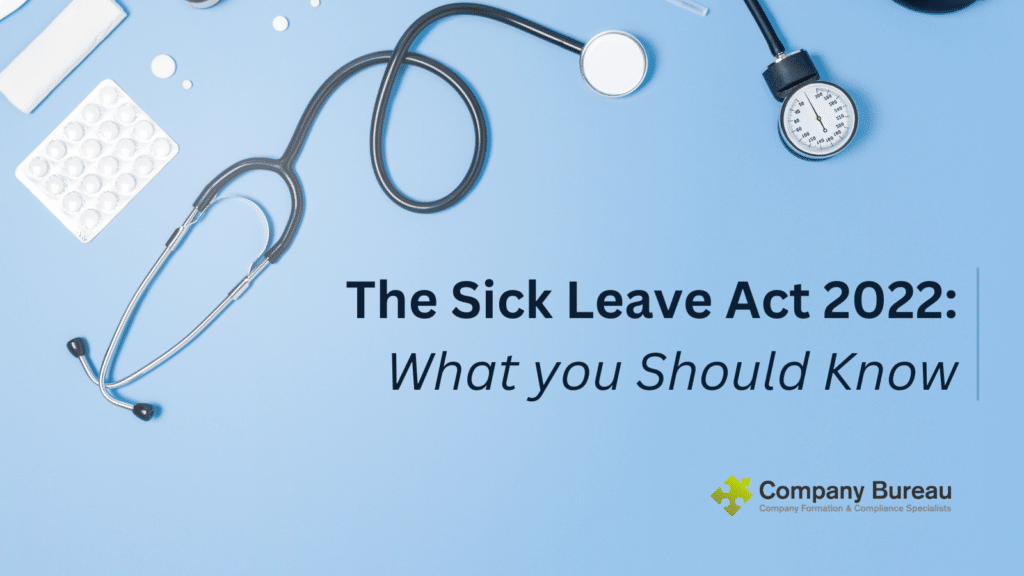By Shannon Power, 13th January 2023
On the 20th of July 2022, the Sick Leave Act 2022 was signed into law by President Michael D Higgins. The Act states that from the 1st of January 2023, employee’s have the right to three days’ sick pay per calendar year. This move by the government is in response to the recognition during the pandemic of the need for greater security for lower-income workers. This is known as Statutory Sick Pay, which is the legal minimum pay all employers must abide by in their sick leave schemes.
What is the Sick Leave Act?
In the past, employees had no legal rights to be paid by their employer whilst on sick leave. Before statutory sick pay, an employee whose employer did not provide paid sick leave could apply for Illness Benefit as an alternative. However, the payment was set as a flat €203/week, and workers had to satisfy a minimum level of PRSI contributions to avail of the benefit. Applicants would not get paid for the first 3 days of their absence, known as ‘waiting days’. This was reduced from 6 waiting days in March 2021.
The new Sick Leave Act 2022 allows for better income security for employees. Within the Act, sick pay is paid by your employer at 70% of your normal pay up to a maximum of €110/day. You must be an employee and work at least 13 weeks with your employer before you can get statutory sick pay.
The entitlement to paid sick leave will be phased in over the next four years as follows:
2023 – 3 days’ pay/year
2024 – 5 days’ pay/year
2025 – 7 days’ pay/year
2026 – 10 days’ pay/year
The staggered roll-out has been designed to avoid placing an excessive financial burden on employers – giving them time to plan and budget for additional costs.
Once entitlement to sick pay from the employer has ended, employees who need to take more time off may qualify for Illness Benefit for the Department of Social Protection subject to PRSI contributions.
What are the Requirements and How to Comply
To avail of the new statutory sick pay, employees must obtain a medical certificate. The entitlement is also subject to the employee having worked for their employer for a minimum of 13 weeks.
In addition, it will be mandatory that employers retain records of any statutory sick leave days taken by employees. These records must be kept for a period of four years. Failure to comply with this requirement may result in a fine of up to €2500.
It is possible that your employer already provides a more generous sick pay scheme, however, it must not go below the statutory amount. Section 9 of the Sick Leave Act 2022 states that if an employer already provides a more favourable sick pay scheme to their employees, they will not be obliged to comply with the statutory sick pay rules.
An employer must demonstrate that any discretionary or pre-existing scheme is definitely more favourable than that provided by the Act. This can be determined by referring to:
- The period of service that is required before the sick leave is payable
- The number of days that an employee is absent before sick leave is payable
- The period for which sick leave is payable
- The amount of sick leave that is payable
- The referenced period of the sick leave scheme
It is advised that employers practice compliance by introducing a sick pay scheme, if none is already in place, review their existing sick pay policies, company handbook, and contracts to ensure they align with the requirements set out in the Sick Leave Act 2022. Compliance must also include informing employees of their rights and obligations under the new Act.
If you have any further enquiries regarding the Sick Leave Act 2022 or Company Compliance, the team here at Company Bureau would be more than happy to assist. Contact us today at +353(0)1 6461625 or fill out our online contact form.
Disclaimer This article is for guidance purposes only. It does not constitute legal or professional advice. No liability is accepted by Company Bureau for any action taken or not taken in reliance on the information set out in this article. Professional or legal advice should be obtained before taking or refraining from any action as a result of this article. Any and all information is subject to change.
